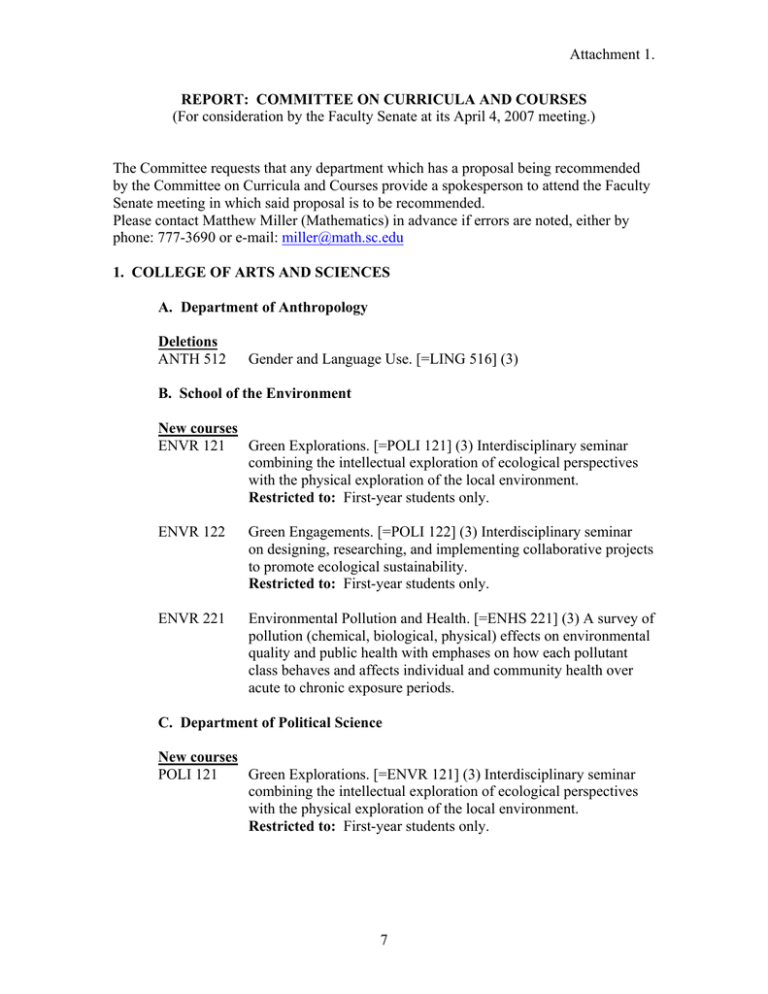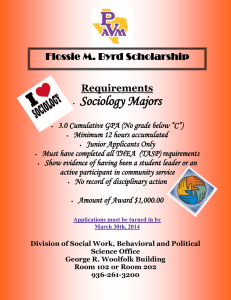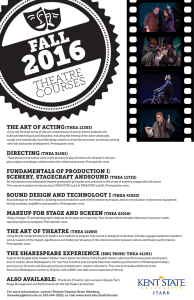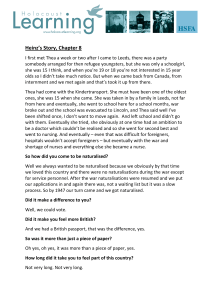Attachment 1.
advertisement

Attachment 1. REPORT: COMMITTEE ON CURRICULA AND COURSES (For consideration by the Faculty Senate at its April 4, 2007 meeting.) The Committee requests that any department which has a proposal being recommended by the Committee on Curricula and Courses provide a spokesperson to attend the Faculty Senate meeting in which said proposal is to be recommended. Please contact Matthew Miller (Mathematics) in advance if errors are noted, either by phone: 777-3690 or e-mail: miller@math.sc.edu 1. COLLEGE OF ARTS AND SCIENCES A. Department of Anthropology Deletions ANTH 512 Gender and Language Use. [=LING 516] (3) B. School of the Environment New courses ENVR 121 Green Explorations. [=POLI 121] (3) Interdisciplinary seminar combining the intellectual exploration of ecological perspectives with the physical exploration of the local environment. Restricted to: First-year students only. ENVR 122 Green Engagements. [=POLI 122] (3) Interdisciplinary seminar on designing, researching, and implementing collaborative projects to promote ecological sustainability. Restricted to: First-year students only. ENVR 221 Environmental Pollution and Health. [=ENHS 221] (3) A survey of pollution (chemical, biological, physical) effects on environmental quality and public health with emphases on how each pollutant class behaves and affects individual and community health over acute to chronic exposure periods. C. Department of Political Science New courses POLI 121 Green Explorations. [=ENVR 121] (3) Interdisciplinary seminar combining the intellectual exploration of ecological perspectives with the physical exploration of the local environment. Restricted to: First-year students only. 7 Attachment 1. POLI 122 Green Engagements. [=ENVR 122] (3) Interdisciplinary seminar on designing, researching, and implementing collaborative projects to promote ecological sustainability. Restricted to: First-year students only. D. Department of Sociology Change in curriculum, Website 2006-07 Undergraduate Bulletin, under Bachelor of Science in Sociology Current Proposed Bachelor of Science in Sociology Bachelor of Science in Sociology 1. General Education Requirements (56-65 hours) 1. General Education Requirements (56-65 hours) See general education requirements for a B.A. in sociology. In addition MATH 111, 122, and 170 must be included as part of the general education requirements. See general education requirements for a B.A. in sociology. For B.S. candidates only, 12 hours for Mathematics/Analytical Reasoning, to include: MATH 122 or 141 (MATH 122 is recommended) MATH 142,170 or 172 (MATH 170 is recommended) STAT 201 (or equivalent) CSCE 102 (or equivalent) E. Department of Theatre and Dance Current Proposed Degree Requirements Degree Requirements Bachelor of Arts, Theatre Bachelor of Arts, Theatre (120 hours) (120 hours) 1. General Education Requirements (53-62 hours) For a general outline, see "College of Arts and Sciences," curricula section I. 1. General Education Requirements (53-62 hours) For a general outline, see "College of Arts and Sciences," curricula section I. Pre-Major: THEA 201 (3) Introduction to Theatre Studies and THEA 119 (1) Introduction to Theatre Production Laboratory. 2. Major Requirements (31 hours) 2. Major Requirements (30 hours) Prerequisite: THEA 201 Introduction to Theatre Studies Required courses: THEA 170, THEA 280, THEA 561, THEA 562, THEA 578 3 hours from the following: THEA 219 (prerequisite for THEA 220 and 221), THEA 220, THEA 221 Majors are required to enroll in a theatre laboratory Required courses: THEA 270, THEA 280, THEA 561, THEA 562, THEA 578 Majors are required to complete 4 hours of Theatre Production Laboratory: THEA 120, 121, 122, & 123 8 Attachment 1. (THEA 219, 220, or 221) course every semester, but only 3 hours count toward the major. Students must complete two different production areas. 6 hours from the following: THEA 240, THEA 252, THEA 253, THEA 288, THEA 289, THEA 359, THEA 370, THEA 372 6 hours from THEA 400 or above Of these 4 laboratory credits only 2 credits may be in performance. THEA 120 & 121 must be completed within the first year of declaring the Theatre major. An additional 6 hours from THEA 200 and/or 300 level An additional 6 hours from THEA 400 or above Special requirement in dramatic literature: Students must take 6 hours of dramatic literature (ENGL 300 or above). May count toward cognate. Special requirement in dramatic literature: Students must take 6 hours of dramatic literature (ENGL 300 or above). May count toward cognate. 3. Cognates, see "College of Arts and Sciences," curricula section I (12 hours) The cognate will be satisfied by 12 hours of nonproduction/performance courses related to the major and must include at least 6 hours of dramatic literature. 3. Cognates, see "College of Arts and Sciences," curricula section I (12 hours) The cognate will be satisfied by 12 hours of nonproduction/performance courses related to the major and must include at least 6 hours of dramatic literature. 4. Electives, see "College of Arts and Sciences," curricula section I (22-31 hours) 4. Electives, see "College of Arts and Sciences," curricula section I (22-31 hours) New courses THEA 121 Theatre Production Laboratory II. (1) (Prereq: THEA 120) Supervised participation in scenic, lighting, costume, promotions, performance and productions of Mainstage Production Program. Course content will vary according to season production program. THEA 122 Theatre Production Laboratory III. (1) (Prereq: THEA 121) Supervised participation in scenic, lighting, costume, promotions, performance and productions of Mainstage Production Program. Course content will vary according to season production program. THEA 123 Theatre Production Laboratory IV. (1) (Prereq: THEA 122) Supervised participation in scenic, lighting, costume, promotions, performance and productions of Mainstage Production Program. THEA 230 Make-up Design for Theatre and Film. (3) Theory and practice of make-up design for theatre and film. The application of analytical and research skills in the visual development of the character. THEA 270 Beginning Acting. (3) (Prereq: THEA 170 or declaration of major) An exploration of the acting process through scene study. Focus will be on developing the actor’s personal technique. THEA 440 Advanced Voice and Speech. (3) (Prereq: THEA 240) Further study and practice of voice and speech topics as applied to performance. Specific skills covered may include vocal flexibility and range, vocal dynamics, dialects and voice-over technique. 9 Attachment 1. THEA 452 Special Topics in Costume Technology. (3) (Prereq: THEA 252 or permission of instructor) A specialty skills course for advanced students of theatrical costume design and technology. Topics will include tailoring, fabric modification, needle-arts, millinery, etc. Course may be repeated as topics vary. DANC 204 Pointe II. (1) (Prereq: DANC 202 or equivalent) Pointe technique and skills on pointe, an extension of ballet technique at the foundational level. May be repeated four times. DANC 275 Pilates I. (1) Innovative system of exercises for the mind and body. Teaching posture, body awareness and easy graceful movement at a beginner’s level. DANC 303 Pointe III. (1) (Prereq: DANC 202 or equivalent) Pointe technique and skills on pointe, an extension of ballet technique at the intermediate level. Study and execution of female variations from classical repertory. Maybe repeated four times. DANC 375 Pilates II. (1) (Prereq: DANC 275 or equivalent) Innovative system of exercises for the mind and body. Teaching posture, body awareness and easy graceful movement at an intermediate level. DANC 407 West African Dance II. (3) (Prereq: DANC 206 or permission of instructor) Study of the development of West African music and dance, emphasizing cultural, social and physical influences. Exploration of the relationship between the dancer and the drummer at an intermediate level. DANC 482 Body Conditioning/Gyrokinesis Method II. (Prereq: DANC 382 or permission of department) Body conditioning technique that simultaneously stretches and strengthens the body at an intermediate level. Gyrokinesis teaches complete freedom of movement through exercises, synchronized with corresponding breathing patterns enhancing aerobic and cardiovascular stimulation and promoting neuromuscular awareness. Restricted to: Dance majors/minors only. Change in course number, title, and description From: THEA 219 Introduction to Theatre Laboratory. (1) Study of health, safety, and other laboratory procedures in preparation for participation in scenic, lighting, costume, promotions, and performance labs. May not be repeated for credit. To: THEA 119 Introduction to Theatre Production Laboratory. (1) Study of health, 10 Attachment 1. safety, and other laboratory procedures in preparation for participation in scenic, lighting, costume, promotions, performance and production labs. May not be repeated for credit. From: DANC 406 To: DANC 307 West African Dance. (3) The history and practice of West African dances. West African Dance I. (3) The history and practice of indigenous West African dance. Change in course number, title, prerequisite, and description From: THEA 220 Theatre Laboratory. (1) (Prereq: THEA 219) Supervised participation in theatre production. No formal class meetings. May be repeated for credit, but no more than four credits may be applied toward the departmental major. To: THEA 120 Theatre Production Laboratory I. (1) (Prereq: THEA 119) Supervised participation in scenic, lighting, costume, promotions, performance and productions of Mainstage Production Program. Course content will vary according to season production program. Change in description From: THEA 170 Fundamentals of Acting. (3) The techniques of body and voice control; improvisations; interpretation of character; characterization applied in scenes. To: THEA 170 Fundamentals of Acting. (3) An introduction to the craft of acting which explores Stanislavski’s techniques through non-verbal and scripted scene work. From: THEA 201 To: THEA 201 Introduction to Theatre Studies. (3) (Prereq: Theatre major or consent of instructor) Introduction to the skills necessary to be a theatre major. Designed to prepare the student to competently complete academic, artistic and technical assignments. Introduction to Theatre Studies. (3) (Prereq: Theatre major or consent of instructor) Introduction to methods of analyzing and interpreting drama, with emphasis on play structure, genre, and style. Designed for the Theatre major in preparation for theatre scholarship, performance, production, and design. 2. MOORE SCHOOL OF BUSINESS A. Marketing Change in prerequisite From: MKTG 350 Principles of Marketing. (3) (Prereq: ECON 224, ACCT 222) To: MKTG 350 Principles of Marketing. (3) (Prereq: ECON 221/222, ACCT 225/226 for BA major sections; ECON 224, ACCT 222 for NonBA major sections) 11 Attachment 1. 3. COLLEGE OF ENGINEERING AND INFORMATION TECHNOLOGY New course ENGR 105 Professional Development and Ethics in Engineering and Computing. (1) (Prereq: Open to first year students only) Introduction to the field of Engineering and Computing in a seminar format. A. Department of Mechanical Engineering Change in title and description From: EMCH 394 Applied Thermodynamics. (3) (Prereq: EMCH 201, EMCH 290) Vapor and gas cycles; non-reactive mixtures and psychrometrics; chemical equilibrium. To: EMCH 394 Thermodynamic System Design and Analysis. (3) (Prereq: EMCH 201, EMCH 290) Design and analysis applied to vapor and gas power cycles, refrigeration and heat pump systems, thermodynamic relations, ideal gas mixtures, psychrometric humid air analysis, and combustion processes. 4. COLLEGE OF NURSING Change in course numbers and prerequisites From NURS 316 Biophysical Pathology. (3) (Prereq: CHEM 102, NURS 220; Coreq: NURS 311) To: NURS 216 Biophysical Pathology. (3) (Prereq: CHEM 102, NURS 220 and MATH 111 or placement score of B22) From: NURS 223 To: NURS 324 Chemical Therapeutics. (3) (Prereq: CHEM 102; Prereq or Coreq: NURS 220, and MATH 111 unless student places out of MATH 111 on the University Math Placement Test) Chemical Therapeutics. (3) (Prereq: CHEM 102, NURS 316) 5. ARNOLD SCHOOL OF PUBLIC HEALTH A. Department of Environmental Health Sciences New course ENHS 221 Environmental Pollution and Health. [=ENVR 221] (3) A survey of pollution (chemical, biological, physical) effects on environmental quality and public health with emphases on how each pollutant class behaves and affects individual and community health over acute to chronic exposure periods. 12 Attachment 1. 6. EXPERIMENTAL COURSES: For the Senate’s information only. (Experimental courses are offered for only one semester and then must be formally submitted as a course.) COLLEGE OF ENGINEERING AND INFORMATION TECHNOLOGY Department of Civil Engineering ECIV 101X Introduction to Civil Engineering. (3) Fundamental concepts in each of the disciplines of Civil Engineering are discussed. Critical thinking skills are fostered by hands on experiences and driving questions in each of the disciplines. 13


